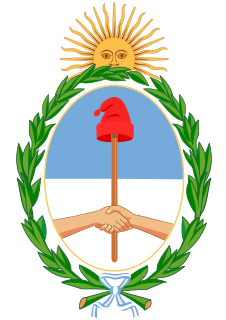Nationality is a legal identification of a person in international law, establishing the person as a subject, a national, of a sovereign state. It affords the state jurisdiction over the person and affords the person the protection of the state against other states.

Jus soli, commonly referred to as birthright citizenship, is the right of anyone born in the territory of a state to nationality or citizenship.

Joan Ruth Bader Ginsburg was an American lawyer and jurist who served as an associate justice of the Supreme Court of the United States from 1993 until her death in 2020. She was nominated by President Bill Clinton to replace retiring justice Byron White, and at the time was generally viewed as a moderate consensus-builder. She eventually became part of the liberal wing of the Court as the Court shifted to the right over time. Ginsburg was the first Jewish woman and the second woman to serve on the Court, after Sandra Day O'Connor. During her tenure, Ginsburg wrote notable majority opinions, including United States v. Virginia (1996), Olmstead v. L.C. (1999), Friends of the Earth, Inc. v. Laidlaw Environmental Services, Inc. (2000), and City of Sherrill v. Oneida Indian Nation of New York (2005).

United States nationality law details the conditions in which a person holds United States nationality. In the United States, nationality is typically obtained through provisions in the U.S. Constitution, various laws, and international agreements. Citizenship is a right, not a privilege. While the domestic documents often use citizenship and nationality interchangeably, nationality refers to the legal means in which a person obtains a national identity and formal membership in a nation and citizenship refers to the relationship held by nationals who are also citizens.

Barbadian nationality law is regulated by 1966 Constitution of Barbados, as amended; the Barbados Citizenship Act, as amended; and various British Nationality laws. These laws determine who is, or is eligible to be, a national of Barbados. Barbadian nationality is typically obtained under the rules of jus sanguinis, i.e. by birth to a father or in some cases, a mother, with Barbadian nationality. It can also be granted to persons with an affiliation to the country, or to a permanent resident who has lived in the country for a given period of time through naturalisation. There is currently no program in Barbados for citizenship by investment, though they do have a special work visa program. Nationality establishes one's international identity as a member of a sovereign nation. Though it is not synonymous with citizenship, rights granted under domestic law for domestic purposes, the United Kingdom, and thus the commonwealth, has traditionally used the words interchangeably.
Birthright citizenship in the United States is United States citizenship acquired by a person automatically, by operation of law. This takes place in two situations: by virtue of the person's birth within United States territory or because one or both of their parents is a US citizen. Birthright citizenship contrasts with citizenship acquired in other ways, for example by naturalization.
Nevada Department of Human Resources v. Hibbs, 538 U.S. 721 (2003), was a United States Supreme Court case which held that the Family and Medical Leave Act of 1993 was "narrowly targeted" at "sex-based overgeneralization" and was thus a "valid exercise of [congressional] power under Section 5 of the Fourteenth Amendment."
Ledbetter v. Goodyear Tire & Rubber Co., 550 U.S. 618 (2007), is an employment discrimination decision of the Supreme Court of the United States. Employers cannot be sued under Title VII of the Civil Rights Act of 1964 over race or gender pay discrimination if the claims are based on decisions made by the employer 180 days ago or more. Justice Alito held for the five-justice majority that each paycheck received did not constitute a discrete discriminatory act, even if was affected by a prior decision outside the time limit. Ledbetter's claim of the “paycheck accrual rule” was rejected. The decision did not prevent plaintiffs from suing under other laws, like the Equal Pay Act, which has a three-year deadline for most sex discrimination claims, or 42 U.S.C. 1981, which has a four-year deadline for suing over race discrimination.
Nguyen v. INS, 533 U.S. 53 (2001), was a United States Supreme Court case in which the Court upheld the validity of laws relating to U.S. citizenship at birth for children born outside the United States, out of wedlock, to an American parent. The Court declined to overturn a more restrictive citizenship requirement applying to a foreign-born child of an American father and a non-American mother who was not married to the father, as opposed to a child born to an American mother under similar circumstances.

Argentine nationality law regulates the manner in which one acquires, or is eligible to acquire, Argentine nationality. Nationality, as used in international law, describes the legal methods in which a person obtains a national identity and formal membership in a nation. Citizenship refers to the relationship between a nation and a national, after membership has been attained. Argentina recognizes a dual system accepting Jus soli and Jus sanguinis for acquisition of nationality by birth and allows foreign persons to naturalize.

The Lilly Ledbetter Fair Pay Act of 2009 is a federal statute in the United States that was the first bill signed into law by US President Barack Obama on January 29, 2009. The act amends Title VII of the Civil Rights Act of 1964 and states that the 180-day statute of limitations for filing an equal-pay lawsuit regarding pay discrimination resets with each new paycheck affected by that discriminatory action. The law directly addressed Ledbetter v. Goodyear Tire & Rubber Co. (2007), a U.S. Supreme Court decision that the statute of limitations for presenting an equal-pay lawsuit begins on the date that the employer makes the initial discriminatory wage decision, not at the date of the most recent paycheck.

Nationality in Mexico is defined by multiple laws, including the 30th article of the Constitution of Mexico and other laws. The Constitution's 32nd article specifies the rights granted by Mexican legislation to Mexicans who also possess dual nationality. This article was written to establish the norms in this subject in order to avoid conflicts which may arise in the case of dual nationality. This law was last modified in 2021.
Attorney General of Botswana v. Unity Dow was a landmark decision of Botswana's Court of Appeal. The case upheld the decision brought to the High Court of Botswana, by the lawyer, Unity Dow, who would go on to become a judge on the High Court and a government minister. It declared provisions of the 1984 Citizenship Act, which barred children from receiving nationality from their mothers, to be unconstitutional. It resulted in the passage of the 1995 Citizenship Act of Botswana, which eliminated gender disparities in the law. The case sparked women to press for changes to nationality laws across Africa.
Caban v. Mohammed, 441 U.S. 380 (1979), was a United States Supreme Court family law case which argued that a New York law, which allowed unwed mothers, but not unwed fathers, a veto over the adoption of that couple's children, was discriminatory.
Califano v. Goldfarb, 430 U.S. 199 (1977), was a decision by the United States Supreme Court, which held that the different treatment of men and women mandated by 42 U.S.C. § 402(f)(1)(D) constituted invidious discrimination against female wage earners by affording them less protection for their surviving spouses than is provided to male employees, and therefore violated the Due Process Clause of the Fifth Amendment to the United States Constitution. The case was brought by a widower who was denied survivor benefits on the grounds that he had not been receiving at least one-half support from his wife when she died. Justice Brennan delivered the opinion of the court, ruling unconstitutional the provision of the Social Security Act which set forth a gender-based distinction between widows and widowers, whereby Social Security Act survivors benefits were payable to a widower only if he was receiving at least half of his support from his late wife, while such benefits based on the earnings of a deceased husband were payable to his widow regardless of dependency. The Court found that this distinction deprived female wage earners of the same protection that a similarly situated male worker would have received, violating due process and equal protection.

RBG is a 2018 American documentary film focusing on the life and career of Ruth Bader Ginsburg, the second female Associate Justice of the Supreme Court of the United States after Sandra Day O'Connor. After premiering at the 2018 Sundance Film Festival, the film was released in the United States on May 4, 2018. The film was directed and produced by Betsy West and Julie Cohen.
Bolivian nationality law is regulated by the 2009 Constitution. This statute determines who is, or is eligible to be, a citizen of Bolivia. The legal means to acquire nationality and formal membership in a nation differ from the relationship of rights and obligations between a national and the nation, known as citizenship. Bolivian nationality is typically obtained either on the principle of jus soli, i.e. by birth in Bolivia; or under the rules of jus sanguinis, i.e. by birth abroad to at least one parent with Bolivian nationality. It can also be granted to a permanent resident who has lived in Bolivia for a given period of time through naturalization.
Costa Rican nationality law is regulated by the Options and Naturalizations Act, which was originally named the Immigration and Naturalization Act and established under the 1949 Constitution. These laws determine who is, or is eligible to be, a citizen of Costa Rica. The legal means to acquire nationality and formal membership in a nation differ from the relationship of rights and obligations between a national and the nation, known as citizenship. Costa Rican nationality is typically obtained either on the principle of jus soli, i.e. by birth in Costa Rica; or under the rules of jus sanguinis, i.e. by birth abroad to at least one parent with Costa Rican nationality. It can also be granted to a permanent resident who has lived in Costa Rica for a given period of time through naturalization.

Batswana nationality law is regulated by the 1966 Constitution of Botswana, as amended; the Citizenship Act 1998, and its revisions; and international agreements entered into by the government of Botswana. These laws determine who is, or is eligible to be, a national of Botswana. The legal means to acquire nationality, formal legal membership in a nation, differ from the domestic relationship of rights and obligations between a national and the nation, known as citizenship.The Botswana nationality is typically obtained on the principle of jus sanguinis, i.e. by birth to parents with Botswana nationality. It can be granted to persons who have lived in the country for a specific period of time, who have performed distinguished service to the nation or who have an affiliation to the country through naturalisation.

Emaswati nationality law is regulated by the Constitution of Eswatini, as amended; the Swaziland Citizenship Act, and its revisions; and various international agreements to which the country is a signatory. These laws determine who is, or is eligible to be, a national of Eswatini. The legal means to acquire nationality, formal legal membership in a nation, differ from the domestic relationship of rights and obligations between a national and the nation, known as citizenship. Nationality describes the relationship of an individual to the state under international law, whereas citizenship is the domestic relationship of an individual within the nation. Emaswati nationality is typically obtained under the principle of jus soli, i.e. by birth in Eswatini, or jus sanguinis, born to parents with Emaswati nationality. It can be granted to persons with an affiliation to the country, or to a permanent resident who has lived in the country for a given period of time through naturalisation or the traditional khonta system.










